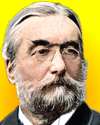 (source)
(source)
|
Sir Joseph Norman Lockyer
(17 May 1836 - 16 Aug 1920)
English astronomer who in 1868 discovered and named the element helium that he found in the Sun’s atmosphere before it had been detected on Earth.
|
Science Quotes by Sir Joseph Norman Lockyer (13 quotes)
At present good work in science pays less well very often than mediocrity in other subjects. This, as was pointed out by Sir Lyon Playfair in his Presidential Address to the British Association in 1885 helps to arrest progress in science teaching.
— Sir Joseph Norman Lockyer
In Sir Norman Lockyer (ed.), 'Physical Science and the Woolwich Examinations', Nature (23 Feb 1888), 37, 386. Webmaster has assumed this unsigned lead article (editorial?) should be attributed to the Editor.
Each of us by his own work and thought, if he so choose, may enlarge the circle of his own knowledge at least, and thus make the universe more and more beautiful, to himself at all events, if not to others.
— Sir Joseph Norman Lockyer
In 'Waves: Preliminary', Studies in Spectrum Analysis (1878), 1.
I must, in the first place, ask my readers to grant me the scientific use of their imagination; and in order that it may not be called upon to cope with questions as to whether space is infinite or not, or whether space and time ever had a beginning, we will not consider the possibility of the beginning of things or attempt to define the totality of space, but we will in imagination clear a certain part of space and then set certain possibilities at work.
— Sir Joseph Norman Lockyer
In 'The History of a Star', The Nineteenth Century (Nov 1889), 26, No. 153, 786.
In physical science in most cases a new discovery means that by some new idea, new instrument, or some new and better use of an old one, Nature has been wooed in some new way.
— Sir Joseph Norman Lockyer
In 'The History of a Star', The Nineteenth Century (Nov 1889), 26, No. 153, 785.
It is impossible with our present knowledge to suppose that at any prior stage of the history of the heavens gravitation did not exist. It is impossible, from what we know now, to suppose that even the finest form of matter which entered our clearing in space was not endowed with motion. Given this matter, its motion and gravitation,… will give us a formation of centres;… rotation…; we shall… get condensing masses of this curdled substance.
— Sir Joseph Norman Lockyer
In 'The History of a Star', The Nineteenth Century (Nov 1889), 26, No. 153, 787-788.
Owing to their [minor planets or asteroids] small size; … The force of gravity on their surfaces must be very small. A man placed on one of them would spring with ease 60 feet high, and sustain no greater shock in his descent than he does on the Earth from leaping a yard. On such planets giants may exist; and those enormous animals which here require the buoyant power of water to counteract their weight, may there inhabit the land.
— Sir Joseph Norman Lockyer
In Elements of Astronomy (1870), 153. The ellipsis reads “the largest minor planet is but 228 miles in diameter, and many of the smaller ones are less than 50.”
Slowly, but very surely, by means of quiet sap,… we are effecting an entrance into the treasure-houses wherein are kept the secrets of the sun.
— Sir Joseph Norman Lockyer
In 'What the Sun Is Made Of', The Nineteenth Century (1878), 4, No. 17, 75. [The term sap comes from trench warfare. It refers to digging a trench (sap) toward the enemy line. In a figurative sense, it means to secretly infiltrate. —Webmaster]
The nineteenth century will ever be known as the one in which the influences of science were first fully realised in civilised communities; the scientific progress was so gigantic that it seems rash to predict that any of its successors can be more important in the life of any nation.
— Sir Joseph Norman Lockyer
From Inaugural Address as President of the British Association, published Nature (10 Sep 1903),439. (Lockyer was editor of the journal at the time.)
The secrets of the sun include the cipher in which the light messages … the Chemistry of Space.
— Sir Joseph Norman Lockyer
How observation of details in the Sun’s light spectrum can be interpreted to reveal the Sun’s chemical composition. In 'What the Sun Is Made Of', The Nineteenth Century (1878), 4, No. 17, 75.
The Telescope, in fact, was comparatively little used until astronomy annexed that important branch of physics to its aid which gave us a Clock—a means of dividing time in the most accurate manner.
— Sir Joseph Norman Lockyer
In Stargazing: Past and Present (1878), 2.
The work of the true man of Science is a perpetual striving after a better and closer knowledge of the planet on which his lot is cast, and of the universe in the vastness of which that planet is lost. The only way of doing this effectually, is to proceed as gradually, and therefore as surely as possible, along the dim untrodden ground lying beyond the known. Such is scientific work.
— Sir Joseph Norman Lockyer
First sentence in Chap. 1, 'Waves: Preliminary', Studies in Spectrum Analysis (1878), 1.
Time out of mind—or, rather, ever since Nicolas Le Fèvre … pointed out that chemistry was the art of separations as well as of transmutations—it has been recognized that, with every increase of temperature, or dissociating power, bodies were separated from each other.
— Sir Joseph Norman Lockyer
In The Chemistry of the Sun (1887), x.
We believe that each molecular vibration disturbs the ether; that spectra are thus begotten, each wavelength of light resulting from a molecular tremor of corresponding wavelength. The molecule is, in fact, the sender, the ether the wire, and the eye the receiving instrument, in this new telegraphy.
— Sir Joseph Norman Lockyer
In Studies in Spectrum Analysis (1878), 118-119.
Quotes by others about Sir Joseph Norman Lockyer (2)
[Lockyer]... sometimes forgets he is only the editor and not the author of Nature.
[Lockyer was the first editor of Nature.]
[Lockyer was the first editor of Nature.]
J. W. L. Glaisher (ed.), The Collected Mathematical Papers of Henry John Stephen Smith (1894), Vol. 1, xliv.
Your printers have made but one blunder,
Correct it instanter, and then for the thunder!
We’ll see in a jiffy if this Mr S[pencer]
Has the ghost of a claim to be thought a good fencer.
To my vision his merits have still seemed to dwindle,
Since I have found him allied with the great Dr T[yndall]
While I have, for my part, grown cockier and cockier,
Since I found an ally in yourself, Mr L[ockyer]
And am always, in consequence, thoroughly willin’,
To perform in the pages of Nature's M[acmillan].
Correct it instanter, and then for the thunder!
We’ll see in a jiffy if this Mr S[pencer]
Has the ghost of a claim to be thought a good fencer.
To my vision his merits have still seemed to dwindle,
Since I have found him allied with the great Dr T[yndall]
While I have, for my part, grown cockier and cockier,
Since I found an ally in yourself, Mr L[ockyer]
And am always, in consequence, thoroughly willin’,
To perform in the pages of Nature's M[acmillan].
Postcard from Tait to Lockyer, editor of Nature, cited by H. Dingle, Nature (1969), 224, 829.
See also:
- 17 May - short biography, births, deaths and events on date of Lockyer's birth.
- Science and Controversy: A Biography of Sir Norman Lockyer, by A. J. Meadows. - book suggestion.
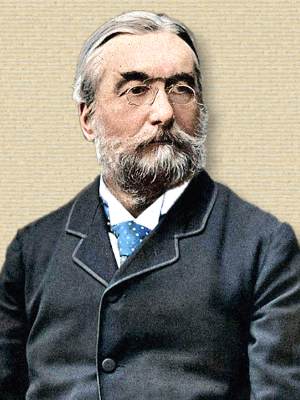
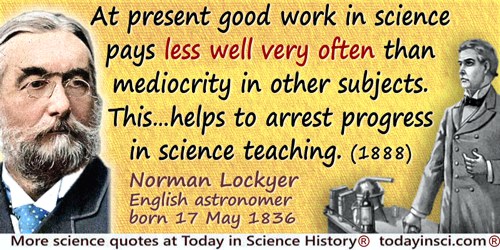
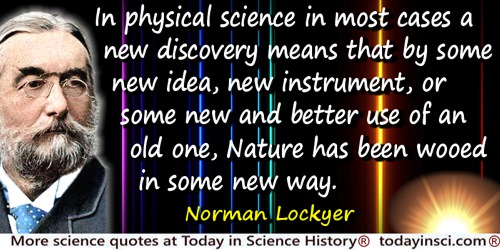
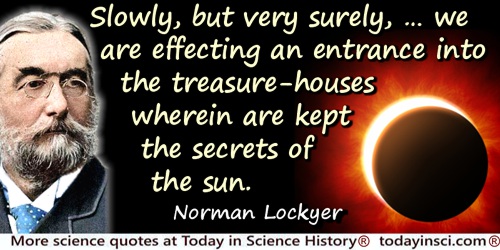
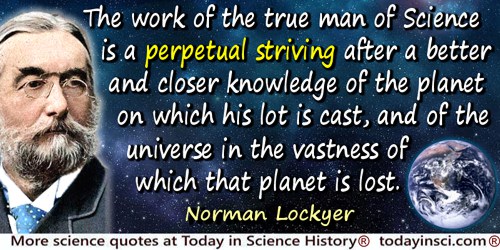
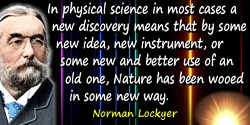
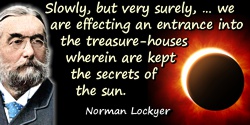

 In science it often happens that scientists say, 'You know that's a really good argument; my position is mistaken,' and then they would actually change their minds and you never hear that old view from them again. They really do it. It doesn't happen as often as it should, because scientists are human and change is sometimes painful. But it happens every day. I cannot recall the last time something like that happened in politics or religion.
(1987) --
In science it often happens that scientists say, 'You know that's a really good argument; my position is mistaken,' and then they would actually change their minds and you never hear that old view from them again. They really do it. It doesn't happen as often as it should, because scientists are human and change is sometimes painful. But it happens every day. I cannot recall the last time something like that happened in politics or religion.
(1987) -- 


